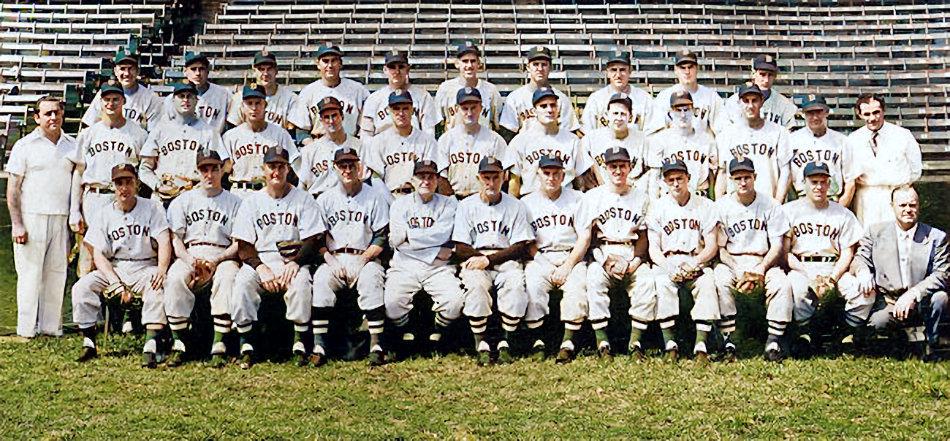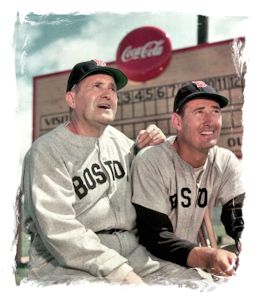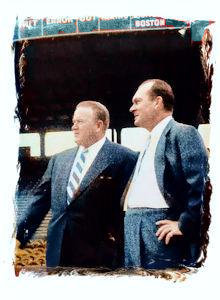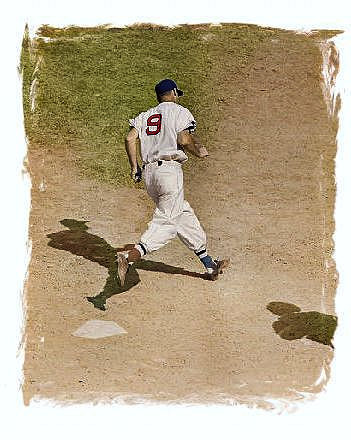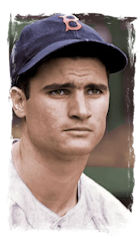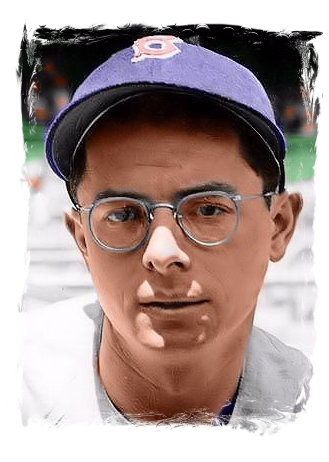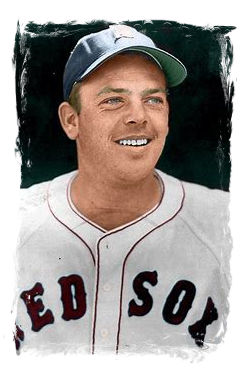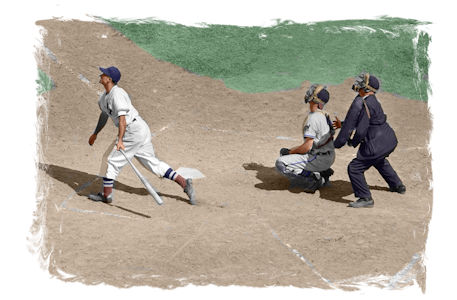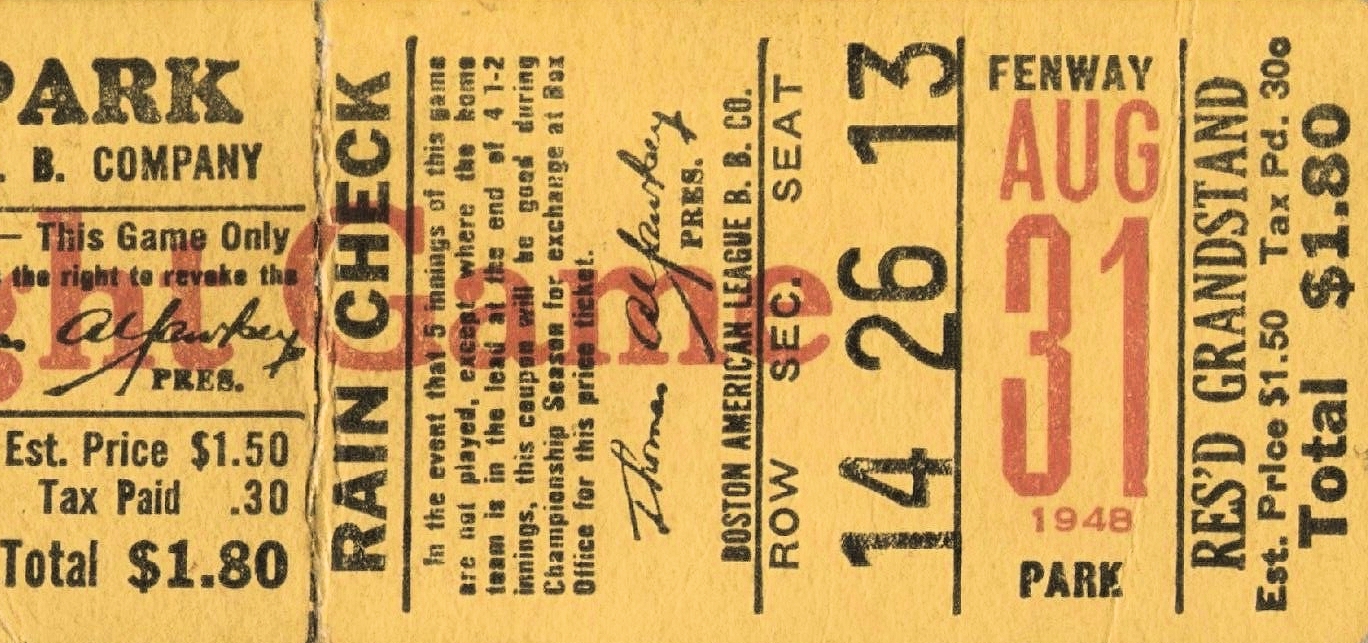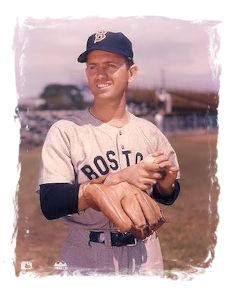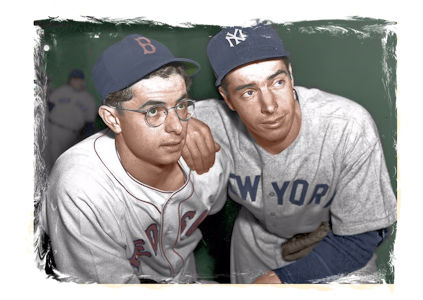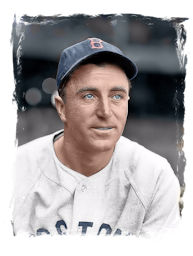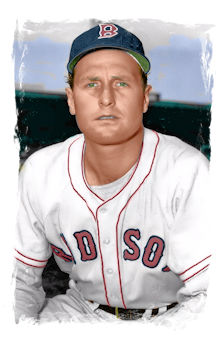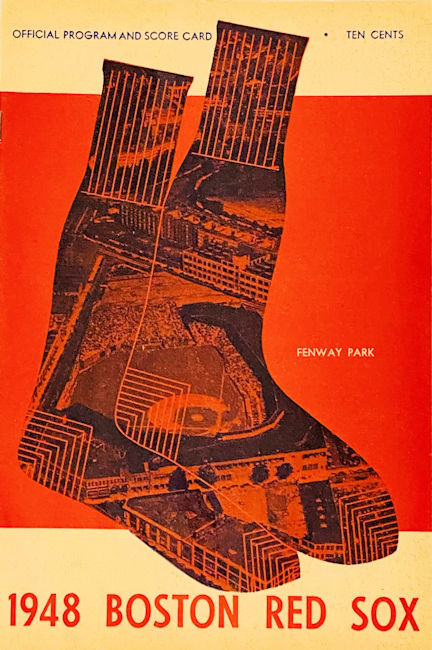|
The 1948 season was one of the most exciting that the city of Boston has ever known. The city monopolized the post season, for the Braves won the National League pennant, and the Red Sox were only a playoff game away from a subway series with their rivals up on Commonwealth Ave. There had been cross-town World Series match-ups in Chicago, New York, and St. Louis before, but never had it happened in Boston.
At the end of the 1947 season Eddie Collins retired and Tom Yawkey convinced Joe Cronin to become the general manager, leaving the manager's job vacant. Joe McCarthy had won a pennant with the Chicago Cubs in 1929, and went on to win seven years with the New York Yankees, being forced to quit because of his well-known problem with alchohol. Cronin, however, hired him to a two-year contract worth $100,000. When McCarthy signed, the Red Sox fans were confident that another pennant was on the way. McCarthy was the man who was responsible for creating the business image of the Yankees, changing the team that one symbolized the excess of Babe Ruth, into one that was disciplined and professional. He was a quiet man, one who believen in discipline and expected the players to take their job seriously, while he protected them from front office interference. He was the man in charge and divided his clubs into those he thought could play and be trusted, and everyone else. Although he was tough on his players, players like Ted Williams also appreciated how he never criticized them in the press and would pull players aside to explain things he had noticed. As a matter of fact, McCarthy considered the press a nuisance and wouldn't tell them much.
The St. Louis Browns had fallen into tough times. The ownership had spent $2 million dollars to renovate Sportsman's Park and build a new facility for their minor league facility in San Antonio. But they drew only 320,000 fans and finished last in 1947. Ownership met with Yawkey in November and told him that if he was willing to cough up the money, their star players Vern Stephens and pitcher Jack Kramer were available. After a two-day meeting, for $375,000 along with Eddie Pellagrini, Roy Partee and some minor leaguers, the Sox acquired Stephens, Kramer, Billy Hitchcock and Ellis Kinder, a shrewd country boy who finally had made it to the big leagues at age 32. It was one of the best deals the Sox would ever make. It made the Red Sox and Yankees the two favorites to win the American League pennant. With starters Tex Hughson, Dave Ferriss and Mickey Harris all nursing sore arms and contemplating surgery, the Sox counted on Jack Kramer to step into the rotation and accept a big role. And as a result of the situation, Mel Parnell got his chance to pitch on a regular basis and he took advantage of it to shine. Ellis Kinder, who was known to enjoy drinking and chasing women, arrived late to spring training and didn't take the regimen seriously enough Joe McCarthy. McCarthy and Kinder butted heads, but Kinder always showed up ready to pitch and he pitched well. Vern Stephens was the key however, as he filled the spot of a big bat to backup Ted Williams. Stephens was a powerful right-handed hitter, a decent fielder, with a great arm, and an annual All-Star. He had a .324 BA at Fenway with 13 homers in only 61 games played there. The Sox reacaquired Stan Spence in December, who they had traded to Washington in 1941 when Dom DiMaggio arrived. Spence went on to have four All Star seasons in Washington. They got him back in a trade that sent Leon Culberson and promising infield prospect, Al Kozar to the Nats. In spring training, the Red Sox were more organized. Players were required to be at specific place at specific times. Card playing and telephones were banned from the club house. In early March, Vern Stephens was made the shortstop and Johnny Pesky was moved over to third-base. Unlike Johnny, Stephens was not quick. He made up for it by playiung deeper and had a powerful throwing arm. Billy Goodman, who had a great year in Louisville made the Red Sox team when they left Sarasota. With the versatile infield they, had Goodman spent most of the early season on the bench, filling in for Bobby Doerr or Johnny Pesky occasionally. But when Jake Jones went into a slump in May, Goodman took over at first base and kept the job for the remainder of the season. Johnny Pesky was asked to take a pay cut of $2500 (down to $17,500) even though he had batted .324 the season before and led the league for the third year in a row with 207 hits. Joe Cronin cited his lack of power as the reason and relied on Pesky's good nature and being a team-first player. Dom DiMaggio received twice as much as Johnny. Had there been a "reserve clause" in baseball, this couldn't have happened. Dom DiMaggio was elected to be the American League player rep because of the stance he took in getting his teammates a raise after coming back from the war. He was someone who was not intimdated by management. Along with Marty Marion of the Cardinals, he two took part in bringing up issues that would later propel the formation of the MLB Players Association. With the arrival of Jackie Robinson the year before, the Red Sox then had a chance to sign Willie Mays. Cronin sent scout Larry Woodall to watch him play. After waiting around for three rainy days, Woodall supposedly grew impatient and headed back to Boston, not having seen Mays play at all and telling Cronin that Willie Mays wasn't big league material.
After losing the MVP vote to Joe DiMaggio, Ted Williams began the season determined to prove that was the wrong choice. While McCarthy was getting to know his club, the Red Sox got off to a horrific start. On April 19th 56,000 fans poured into Fenway Park to inaugurate the new season on Patriot's Day. With the annual running of the Boston Marathon, it was a tradition to have a doubleheader. The Sox scheduled a morning game, allowed the fans to see the end of the race, and then played a second game in the afternoon. Early arrivals were entertained by Jimmy Coughlin's Band, and shared the spotlight with the Philadelphia A's legendary Connie Mack. At 10:15 AM, two bands and a squad of Marines marched to the flagpole to hoist "Old Glory". Governor Bradford threw out the first pitch and the 1948 season got underway. In the second inning, Stan Spence, Vern Stephens and Bobby Doerr clouted successive homers, not taking long to show the potency of the Red Sox lineup. But unfortunately the Sox bats went cold for the rest of the game, with the A's tying it up and sending the game into extra innings. Philly scored two runs on the top of the 11th and the first game of the doubleheader went in the loss column. After Canadian runner, Gerard Cote, crossed the finish line at the marathon, 33,875 fans filed back into Fenway Park to see the second game. Before the 3:15 start, Vaughn Monroe serenaded the crowd from atop the Red Sox dugout. It was rookie and war hero, Lou Brissie, who held Sox to four hits in a doubleheader sweep for the Athletics. After being swept by the A's at Fenway Park to open the season, the Sox couldn't garner their first win until they met the Yankees at the Stadium on April 23rd, before Babe Ruth and a crowd of 44,619 fans, as Mickey Harris shut them out 4 to 0. But that was it, as the Yankees took 2 of 3. The Sox went to Washington on April 26th. The Sox outpointed the Senators, 6 to 0 in the season's first night game at Griffith Stadium. Mel Parnell supplied the magic on the mound with a five hitter, and Ted Williams supplied the thump at the plate with four straight hits for a perfect night at bat. Ted hit his 3rd homer in 11 games and the 200th of his career on April 29th. Thru the end of April, Ted was batting .400, while most of the other Sox starters slumped.
Jack Kramer had reported to spring training with the flu and hurt his leg, not making his first start until May 1st, when he beat the Yankees 8 to 6. The Sox hammered four Yankee pitchers with Kramer and Denny Galehouse pitching for the Sox. The Red Sox had gone through four consecutive losses at home before finally finding the win column. Ted hit his fourth homer of the year and a triple, to beat the Yankees at Fenway on May 2nd. The Sox took 2 of 3 from the Yankees, winning 3 of their last 4 games. Dave Ferriss won his first victory of the year for the Sox on May 4th against the Tigers. With the score tied at 3 to 3, Wally Moses singled to center to score Sam Mele. Dom DiMaggio then reached on an error and Johnny Pesky reached on a fielder's choice. Ted came up and smashed a single to center to score Dom with Pesky going the third. Then Vern Stephens hit a tremendous triple to center to score both of the runners, making the score 6 to 3 in favor of the Red Sox. It was Ted's arm that beat the Tigers on May 5th. Down 3-1, Stan Spence had tied the game in the bottom of the ninth with an RBI single. In the tenth, with runners on second and third and one out, Hoot Evers hit a fly to left. Ted made the putout and threw out Johnny Lipon trying to score the go-ahead run, at the plate. Then Stephens came to bat and laced a walk-off homer in the 11th inning for a 4-3 win. Dave Ferriss seemed healthy but had lost his control. Tex Hughson was still hurt, and after pitching two innings in relief on May 8th, he was sent down to the Austin Pioneers. The Sox then lost five in a row, losing both ends of a Sunday doubleheader to the Indians on May 9th. The Sox slipped to 6th place, five games behind the A's. Ted, however, kept hitting, knocking out his 6th and 7th homers of the year and still batting around .400 while his teammates slumped badly at the plate. The Sox started a winning streak on May 11th. The Chicago White Sox dropped their seventh straight game to the Red Sox by an 8 to 0 score. Jack Kramer threw a six-hit shutout, and three home runs, two by Vern Stephens and the other by Bobby Doerr, paced the Red Sox offense. The next day, on May 12th, Bobby Doerr clouted a 10th inning walk-off homer to bring the Sox from behind. The Red Sox won their third straight game on May 15th, beating the Washington Nationals, 5 to 0. Joe Dobson's strong right arm let him win his second game of the year, giving up only three hits, walking three and permitted only one base runner to reach third base. On May 16th the Sox climbed back to the .500 mark by clobbering the Nats in the final game of the home stand. The previously silent bats rang out 19 hits. Johnny Pesky's two run triple knotted the score at 5 to 5 in the fourth inning, and the Sox went on to win, 14 to 5. The Sox were in 4th place, five games behind. Pitching became problematic, having lost two in Detroit and two of three in Cleveland. allowing their opponents 39 runs in the five games. Sox pitchers also issued 21 base-on-balls in just a nine innings span, as the team fell back in the standings. In their only victory in Cleveland, Matt Batts and Billy Goodman bashing home vital runs and Ted Williams getting four hits and two walks in six plate appearances, defeating the Indians 11 to 5 on May 21st. The Sox used three different firstbasemen since the season started and nine different pitchers took the ball. On May 25th, Joe McCarthy decided on Billy Goodman as his firstbaseman. Things went from bad to worse in Chicago and St. Louis where they lost three of the four games. The Red Sox got some luck on May 26th and with the help of a costly Browns error, they came up with two runs in the 10th inning to beat St. Louis by a 5 to 3 score, and gave Joe Dobson his fourth win of the year. Vern Stephens batted in three of the five Sox runs. Joe McCarthy was critized harshly in the press and at one point considered resigning. Joe Cronin flew down to Washington at the end of the month and spent the four game series with the team. When McCarthy felt the pressure he drank and was driunking when Cronin arrived. Cronin respected him deeply, worked to pull him out of it and talked him into remaining with the team. In Washington the Sox lost four straight and moved on to Philadelphia. In a May 31st doubleheader, after Joe Dobson had blinded Philly on four hits in the opener of the doubleheader, 7 to 0, Mickey Harris lost a spirited pitching duel to Joe Coleman by a score of 2 to 1, on balk called with the bases full that cost him the second game. At the end of May they were 14�23, and in seventh place.
The Sox big guns were booming as Vern Stephens, Bobby Doerr and Stan Spence hit three successive homers in Philly on June 1st, just as they did in Boston on Patriots' Day. Ted Williams enjoyed a field day against the shift, with three hits. The Sox lost 12 of 15 on the road trip and returned to Fenway Park 10 1/2 games out of first, in 7th place. Only Joe Dobson had pitched effectively. The Red Sox have won only 3 games of 15, since leaving Boston in late May, and Dobson was been the winning pitcher in each game. Not only was their pitching was spotty and everyone on the Red Sox was not hitting except for Ted, who batted .379 with 10 home runs and 39 RBIs. The rest of the team finally started hitting in June, and rookie Billy Goodman took over at first base. Suddenly the Red Sox could not lose. The Red Sox provided the best antidote to their position in the standings, by getting good pitching, hitting and fielding. On June 3rd, the Sox picked up two runs in the opening inning aided by Bobby Doerr and went on to produce what proved to be, the winning run in the sixth inning on doubles by Birdie Tebbetts and Dom DiMaggio. Jack Kramer got the win and it was the first of his streak of 11 straight victories. They next twice dumped the Browns by scores of 10 to 4 and 7 to 2 on June 4th. They took three of four from the Browns to start the homestand, but were 9 1/2 games behind. On June 6th, in their most productive afternoon of the season, the Red Sox came from behind twice to win both games and springboard themselves from seventh place to a three way tie for fourth. The Sox twice downed the Detroit Tigers by scores of 5 to 4 and 12 to 4, to capture their second doubleheader in a row and run their present winning streak to five straight games. Ted Williams, Stan Spence and Vern Stephens sent three successive home runs out of the park in the sixth inning of the second game. The Red Sox reached a new high for the season when they beat the Cleveland Indians 15-7, at Fenway Park on June 10th. Bob Feller was forced out of the game in the third inning when the Red Sox scored eight runs. The next day, June 11th, Ted Williams put on one of his better hitting shows, driving in seven runs. The Sox beat the White Sox 12-4, for their seventh victory in eight games. After a 7-3 homestand the Sox headed to Cleveland for another showdown with the first place Indians, 9 1/2 games behind them in fifth place. On June 15th, Mel Parnell outpitched Bob Lemon, 7 to 3. Ted Williams slugged a home run, two doubles and a single in four times at bat, as the Red Sox beat the Indians on June 16th, by a 7-4 score. In the process, Ted raise his batting average to .408, going 4-for-4. Dom DiMaggio's sixth inning homer broke a 6-6 tie as the Sox edged the Indians in the final game, 8 to 6 on June 17th, to sweep the three-game series.
On June 19th, the Red Sox won their 12th game in their last 15 starts and got back to the .500 mark, by beating the Detroit Tigers 9 to 7 at Briggs Stadium. In the next game, they lashed a dozen hits and a total of 22 bases, beating the Tigers 8 to 3 on June 20th. The Red Sox had won all five games on their road trip and had taken 13 of their last 16. In Chicago, June 22nd, the Sox rallied to grab an 11 to 6 win over the White Sox. Dave Ferriss held the White Sox scoreless for six innings, allowing just three scattered hits, walking one and striking out four, to pick up his third win of the season. The Sox finished in Chicago on June 24th, down by a score of 5 to 1 in the second inning in the second game of a doubleheader, the Red Sox, paced by Ted Williams' 14th home run of the season, took the lead and won 8 to 5. Ted then hit his 15th home run in the eighth. When the afternoon was done, Ted's batting average sat at in unbelievable .417, with two homers, a double and four base on balls. Vern Stephens (.304 BA) was the hot batter for the Sox. He had hit safely 14 times in 28 at bats with 13 RBIs. In the last 18 games, he had knocked out 6 home runs. Joe Dobson hurled a two-hitter in the opener on June 27th, as the Sox swept a doubleheader in St. Louis. The Sox had won 18 of their last 23 games and picked up a full 5 games in the standings, to move to 5 1/2 games of first place. In addition Ted Williams' RBI total was sent up to 69 to lead the American League, Ted had hit in 14 consecutive games, going 27 for 53 for a .509 average during that run. After starting their road trip with seven straight wins, the Sox finished it with a 10-5 record on the trip. They returned to Fenway, having been 9 1/2 games out when they left, and 6 1/2 games out when they returned, as June ended. Ted Williams hit .460 for the month and the Red Sox went 18-6.
On July 4th, erupting like a giant firecracker, the Sox buried the Philadelphia A's, 19 to 5, with a 14 run seventh inning. Billy Goodman crashed out four consecutive hits, knocked in four runs and scored a pair himself. Johnny Pesky knocked in five runs on a couple of singles during the big seventh inning. Ellis Kinder, who was clipped for nine hits including two home runs, survived it and in the bargain knocked out three hits himself, including a pair in that seventh inning. Presenting a thrilling finish in the second game of the day, on July 5th, the Sox twice knocked off the New York Yankees by scores of 6 to 5 and 8 to 7, in a thrill packed doubleheader. Bobby Doerr enjoyed a big day at the plate with three home runs and a single, to provide a fitting twin killing. His third homer of the day tied the second ballgame that seemed apparently lost. Down 7 to 5 with two away, he drove his 13th home run of the year off the left-field light tower to tie up the game at 7 to 7 in the nightcap. The Sox sent the fans home in the ninth-inning when they scored on Dom DiMaggio's base hit for the 8-7 walk-off. The Sox swept the three-game series by downing the Yankees, 2 to 1, on July 6th. Joe Dobson held the Yanks to five hits and lost a shutout by one run in the eighth-inning. On July 8th, Mel Parnell scattered eight Washington hits, to give the Sox a 4 to 1 victory in the last game of the homestand. Although Parnell's pitching was outstanding, the big spark was provided by Ted. His two base hits provided the first and final Red Sox runs. While fooling around in a sparring contest with Sam Mele on the train to Philadelphia, Ted Williams separated the cartiledge from his rib and went on the DL. The Sox went on the road to Philadelphia after going 5-3 on the homestand. On July 10th Jack Kramer's solid shutout pitching and a first inning home run by Vern Stephens, carried the Red Sox to a 4 to 0 triumph. Kramer chalked up his seventh win in succession, spreading out ten A's hits so effectively, that only one man ever reached third base. The Sox next split a doubleheader with the A's on July 11th. Winning a dramatic 9 to 8, 10 inning opener, they were slapped around for a 7 to 5 loss in the second game. Five times during the opener, the lead changed hands. Joe Dobson failed to hold a 2 to 0 lead and a 5 to 3 advantage. He was sent to the showers in favor of Dave Ferriss in the third inning. For 5 1/3 innings, Ferriss hurled brilliant one-hit shutout baseball. The Sox were in fourth place, 6 1/2 games behind at the end of the day. On the day before the All Star break, the Sox split a doubleheader with the Athletics in Philly. Johnny Pesky, whose average had slipped down to .258, went 6 for 9 in a doubleheader. The Sox won the first game in 10 innings, coming from behind to win 9 to 8. But the blue laws halted the second game at 6PM and the Sox were on the losing end. Ted's chest injury allowed him only to draw a walk, as a pinch hitter, in the All Star Game on July 13th in St. Louis. Bobby Doerr went hitless and Vern Stephens got a base hit as a pinch hitter. Birdie Tebbetts walked and scored during a winning three-run A.L. rally. He played from the fourth inning until the end, as the American League stars won the game, 5 to 2. After the break, Joe McCarthy settled on a pitching rotation of Jack Kramer, Joe Dobson, Mel Parnell and Ellis Kinder. Even without Ted, the Sox went on to put up a great comeback. They took 15 of the 16 games played at Fenway Park, after the All Star break, and went from 6 1/2 games out to being tied for first.
On July 15th, in the second game of a doubleheader with the Tigers, Mel Parnell threw his best game since putting on a Sox uniform, 3 to 1, in winning his fifth game of the year and his seventh complete game. He won his own game when he doubled to left-center in the third inning, scoring Wally Moses who had walked, and Matt Batts who had doubled. Parnell scored himself on Johnny Pesky's double. The afternoon game, the first of the two admission doubleheader, was a helter-skelter affair in which Bobby Doerr, although striking out three times, provided the decisive blow with a fifth inning home run, with two men on, to sew up a 6-5 victory. In the next game, in the face of the seven hit pitching by Joe Dobson, the Tigers lost their third game of the series by a score 5 to 3 on July 16th. Dom DiMaggio supplied the decisive blow, a double that broke a tie game up in the seventh inning. Tex Hughson was recalled by the Sox on July 12th and pitched the ninth inning of a 3-1 loss to the Tigers on July 17th, retiring the side in order. After losing that game, the Sox then hosted the St. Louis Browns. The troublesome Browns outhit the Red Sox 23 to 19, pulled off a triple play, used six pitchers, but dropped a doubleheader to the Sox by scores of 12 to 5 and 7 to 6, on July 18th. The Sox came from behind in both games to notch their sixth and seventh wins in the last nine games. Johnny Pesky had a great day coming up with five hits in seven times at bat. Bobby Doerr's grand slam homer and Mel Parnell's wonderful pitching, gave the Sox a 4 to 1 victory over the Browns on July 19th. The Sox made it four straight and a clean sweep of the series with St. Louis, as they batted their way to an 8 to 3 victory on July 20th. Birdie Tebbetts struck the big blow for the Red Sox with a base clearing double in the four-run fifth inning. Jack Kramer registered his ninth straight win.
The next day, July 21st, the Sox took a doubleheader from the White Sox, as they scored three runs in the bottom of the ninth in the second game, for a walk-off, come-from-behind win. Down 9-7 in the ninth, Stan Spence ignited the rally with a single to right. Bobby Doerr was next hit in the back with a hard fastball. After he took first, Sam Mele stroked a double inside the right-field foul line close to the stands, allowing Doerr to come in with the tying run and Mele to move over to third. Goodman was then walked, to load the bases and Matt Batts lifted a fly out to right, that gave Mele enough time to tag up and slide across the plate with the winning run, 10 to 9. Doerr's double and Billy Goodman single gave the Red Sox a one to nothing lead in the second inning of the first game. Doerr's triple off the centerfield wall an infield out marked up the second run in the fourth. The Sox went on to win, 3 to 1. Bobby Doerr enjoyed his first perfect game of the year, with two singles, a double and a triple. The Sox next whipped the White Sox by 3 to 0 and 5 to 3 scores, on July 22nd. Vern Stephens belted his 19th and 20th home runs and batted in five RBIs. The Red Sox won their ninth in a row after humiliating the Chicago by score of 13 to 1, on July 23rd, and a clean sweep of their five-game series. Mickey Harris put down the White Sox only five hits. The game also marked the return of Ted to the lineup after a 15 game absence. The Red Sox taking 3 of 4 from the Tigers, sweeping the Browns and the White Sox, winning nine straight and moved into 3rd place, only 1 1/2 games out of first. Bobby Doerr was particularly sad to see the White Sox leave town, getting 10 hits in 17 times at bat over the five games, with three doubles, a triple and a home run for six RBIs. Vern Stephens (.302 BA) with 84 RBI became the American League leader and second in the league with 20 HRs. Next the Cleveland Indians came to Fenway, with first place on the line. On July 24th, the Red Sox won a thrilling twin bill, coming from behind both times, sneaking by with a 6 to 5 decision in the first game and a 2 to 1 victory in the second. Ted's line drive single won the first game, and his double off the left centerfield wall tied the second one, setting up the winning run. Mel Parnell (7-5) posted his fourth straight win. But an American League regulation was changed in the course of the day. Both Johnny Pesky and Joe McCarthy were thrown out of the game in the third inning of the first game for arguing a called third strike. At the time when a player was ejected it was for the day and therefore both games of a doubleheader. Pesky was too important to the team and Tom Yawkey sent a letter to the American League President, Will Harridge, saying that a doubleheader should be considered two seperate games. Harridge agreed and changed it. On July 25th, Joe Dobson (13-6) shut out the Indians, 3-0, for a series sweep. It was the Red Sox 12th straight win, going 15-1 on the home stand. Dom DiMaggio roamed far and wide to gather in seven flyballs, two of which bordered on being miraculous, and coming at the most opportune moments. His fielding saved at least three runs. In addition Dom belted a home run off Satchel Paige, who was pitching his first major-league game in Boston. With the Braves splitting a doubleheader in St. Louis, Boston found both their baseball teams in first place since September 4, 1916. Ellis Kinder unwrapped his finest pitching performance of the season, a three-hit shutout, muzzling the Tigers, 8 to 0 in Detroit on July 27th. The Sox won 13 straight games before finally losing the second game of their road trip in Detroit. They finished in Detroit taking 2 of 3. In the final game on July 29th, Jack Kramer (12-3) won his 11th straight by limiting the Tigers to one run and seven base hits. He also smashed out a home run in the third inning in an 8-1 laugher. Bobby Doerr hit a home run that was his 100th hit of the season and also stretched his errorless streak to 38 games. On July 30th, the Sox faced the Indians in Cleveland and battled back to capture the game, 8-7, pushing their American League lead to 1 1/2 games. Doerr (20 HRs) knocked out his 12th home run of the month. The win was the 18th out of the last 20 for the Red Sox and marked the 8th straight time they have defeated the Indians this season. The Sox finished a fantastic month in first place. They were 11 1/2 games behind on May 31st, and now in first place, by 1/2 game, winning 25 of the 36 games they played in August.
But the Red Sox then lost three straight to the Indians and looked like anything but pennant contenders. The did however, next take two of three from the Browns in St. Louis. They outscored the 7th place Browns, 15 to 8, in a sloppy game on August 3rd. The Browns outhit the Red Sox 14 to 12, but their six pitchers gave up nine base on balls, and committed two costly errors, which gave the Sox impetus in this seventh and eighth innings, thus sewing up the verdict. They lost the next day on a walk-off line drive single to left that climaxed a two run ninth, and enabled the Browns to come from behind and edge the Red Sox, 9 to 8. Tex Hughson came in and pitched a great game, in relief of Joe Dobson and Dave Ferriss, to gain his second win of the year on August 5th, as the Red Sox enjoyed an 8 to 7 triumph over the troublesome Browns in the series finale. In Chicago, the Sox lost 3-of-4 but on August 8th, they split a doubleheader with the last place White Sox. The Red Sox had won the opener by a score of 8 to 1. Mel Parnell coasted to an easy victory, as the Red Sox bats exploded for 13 hits. Johnny Pesky had three singles to lead the attack, but more decisive blows were struck by Wally Moses with a single and double that drove in three runs. After losing the second game, the Red Sox had dropped to 2 1/2 games behind the league-leading Indians, into fourth place.
The Sox started climbing back against the Yankees. Timely hits by Dom DiMaggio and Vern Stephens gave the Red Sox a dramatic 9 to 6 victory over the Yanks at the Stadium on August 10th. They had two big rallies with three runs in the first inning and five in the eighth-inning that enabled them to come from behind and win. They won again the next day, August 11th, behind Denny Galehouse, taking another game from the Yankees, and then traveled down to Washington in third place, two games out of first. Against the Nationals, on August 13th, Mel Parnell took a no-hitter into the seventh inning, as the Sox coasted to a 6-2 win. The next day, August 14th, the Sox came from behind. Down 3-0, they, scored four runs in the eighth inning to grab a 4-3 win and move into second place. Johnny Pesky led off with a hit to deep short and Ted lined his only hit of the afternoon into center, moving Pesky over to third. Vern Stephens snapped out of his slump with a line drive single to left that scored Pesky and gave Stephens his 100th RBI, to lead the major leagues in that department. Ted moved over to third and Bobby Doerr then drove a long fly and Ted jogged home after the catch. Stan Spence moving Stephens down to second and Billy Goodman's ground ball made it thru into the outfield between first and second, scoring Stephens with the tying run. Spence made his way to third and Goodman went to second when the ball was bobbled. Matt Batts was passed purposely to load the bases. Wally Moses came in as a pinch hitter and hit a deep fly ball to center that permitted Spence to come across with the go-ahead fourth run. Earl Johnson sewed up the win pitching a scoreless eighth and ninth. The Sox finished their 11-9 road trip with a doubleheader split on August 15th, taking 3 of 4 games in Washington. Jack Kramer (13-4) ended his consecutive victory streak at 11 games, with a loss in the first game. Dom DiMaggio led off with a single and four of the next five batters were walked and forced in two runs. Matt Batts knocked a clean single to right after that, to score two more, giving the Sox a 4 to 0 lead. They won 8 to 7, and Bobby Doerr's errorless inning string sat at 56 games. As the Sox came home, they were in third place, 2 1/2 games back. On August 16th, Babe Ruth passed away at the age of 53. The cancer treatments that he received had proven ineffective and by early summer, it was evident that he would not live much longer. He did managed to attend the opening of the film made about him "The Babe Ruth Story" starring William Bendix in June, but he was barely able to speak and was hospitalized soon after. On August 18th, Denny Galehouse had another effective pitching performance that boosted the Sox into second place, but he was somewhat overshadowed by the hitting and running of Ted Williams, who had three hits as did Birdie Tebbetts. The Red Sox whipped the Philadelphia A's by a 10 to 2 score.
Then, down 4-1 going into the ninth-inning of the opening game of a doubleheader, on August 20th, back at Fenway Park, Vern Stephens' home run, with two aboard and two outs, tied the game. Stan Spence's walkoff home run pulled out a 5 to 4, 10 inning victory. The Sox next overwhelmed the Nationals, 10 to 4, in the second game, highlighted by Dom DiMaggio's grandslam homer. The next day, August 21st, the terrific one-two hitting punch furnished by Vern Stephens and Bobby Doerr, carried the Red Sox, as they slugged out a 10 to 6 decision over the Nats. Stephens, whose broad shoulders, had been keeping the Sox in the pennant scramble, knocked out a pair of home runs. One of them came with the bases loaded. Doerr, besides delivering a home run for the first Sox score, broke up a 6 to 6 deadlock in the eighth-inning. With the bases loaded, he drilled a single through the infield. Both Stephens and Doerr drove in eight runs between them and scored five. They accounted for four of the eleven Sox hits. Five RBIs increased Stephens' league leadership over Joe DiMaggio with 112. He had now hit 26 home runs, the most he had ever belted in the major leagues. Mickey Harris set back Washington by a score of 4 to 1, on August 22nd, allowing the Red Sox to creep within one half game of the league-leading Indians. Bobby Doerr's 23rd home run in the third inning, with Stephens aboard, furnished Harris with the winning margin.
The Red Sox had won 10 of their last 12 games and were now only 1/2 game behind Cleveland as they next hosted the first place Indians in a classic showdown at Fenway Park. The opening game on August 24th, was a matchup between Joe Dobson and Satchel Paige. An estimated 20,000 fans were turned away. The Indians scored twice in the ninth to take an 8-6 lead. But the Sox came from behind and edged the Indians, 9 to 8, on Vern Stephens' two run walk-off homer in the ninth-inning. The second game the next day, was no contest as Bob Lemon shut out the Sox, putting them back into second place 1/2 game behind. The Red Sox moved back on top of the American League in the third contest on August 26th. Bobby Doerr (24 HR, .288 BA) belted a towering eighth inning home run to shove the Indians back into second place by an 8 to 4 count. The Red Sox next took three of four from Chicago, moving 1 1/2 games ahead of the pack. On August 27th, they knocked off the White Sox, 10 to 5. Ted Williams had a 400 foot homer into the lower portion of the bleachers, behind the visiting bullpen with two men aboard. The next game, on August 28th, had Ellis Kinder keep seven White Sox hits scattered, as he hurled the Red Sox to a 6 to 2 triumph. Vern Stephens slapped out four hits. The third, and eventual winning run, was scored by the Sox in the second inning. With one out, Dom DiMaggio singled and Johnny Pesky walked. After another out, Stephens ripped a single into left to bring Dom home.
Then on August 29th, Birdie Tebbetts hit a grandslam homer in the first inning which went on to win the first game of a doubleheader with the Browns, 10 to 2. But the Sox lost the services of their hottest player in the game. While racing to beat out an infield hit, Bobby Doerr pulled the muscle in his left thigh. Doerr had played through 69 consecutive games without an error. He handled 381 chances in succession. The record was held by Stuffy Stirnweiss who went 71 games and 383 chances. Billy Hitchcock proved to be an ideal replacement for Doerr, when the Red Sox trampled the Detroit Tigers, 8 to 4 on August 31st. Hitchcock belted home three runs and scored the fourth, to help Mel Parnell win his fourth consecutive victory. At the end of the month, the Red Sox had battled their way back into first place, up a game over the Yankees and 1 1/2 games over the Indians.
On September 1st, Hitchcock again led the Red Sox to a 10 to 1 triumph over the Tigers, by driving home three runs on three singles, and giving Jack Kramer an easy 15th win. Johnny Pesky's base clearing triple sealed the deal in the first inning. The Red Sox closed the 15 game homestand, going 12-3 and sweeping two games from the Tigers. In the homestand the Sox scored 106 runs, an average of seven per game, while the opponents scored less than five. Dom DiMaggio hit .354; Johnny Pesky hit .345; Ted Williams has .352; and Vern Stephens hit .286 while driving in 19 runs and knocking out four home runs. Bobby Doerr hit .360; Billy Goodman has hit .365; Stan Spence hit .260; and Birdie Tebbetts hit .326. In Philadelphia on September 3rd, Joe Dobson kept the Red Sox on top of the American League with a great pressure pitching job, shutting out the Athletics, 2 to 0. In winning his 15th game of the year, Dobson threw a four hitter, but needed to be perfect, because the Yankees had taken a doubleheader from Washington. The Sox went on to sweep the series in Philadelphia. On September 4th, the Sox clung to their one half game advantage with a 5 to 3 triumph over the A's. Billy Hitchcock and Ellis Kinder shared the game honors. Hitchcock drove in two runs and scored two as Kinder notched his seventh win with some stellar clutch pitching. On September 5th, Wally Moses drove in the run that gave the Sox an extra inning victory, 4 to 3.
The Sox stayed ahead of the Yankees by 1 1/2 games and 4 1/2 games in front of the Indians, after a doubleheader sweep of the Senators on September 6th. The Sox won the opener on power, 14-6, as Mel Parnell won his fifth straight, and Jack Kramer (16-4) held Washington to just four hits, winning his 16th in the second game, 2 to 1. Wally Moses and Goodman led the assault in the opener, with four hits each. Moses knocked in three runs and scored a pair himself. Goodman chased two teammates across the plate and scored one run. He singled in Sox winning run in the second game, and it gave him a 10 game hitting streak. The Red Sox had won 22 of their last 26 games. The Yankees moved into Fenway Park in a battle for first place on September 8th against New York. The Yankees opened the game with a four-run splurge. But the Sox wiped that out the first time they went to bat. Dom DiMaggio ignited a five-run first inning and a four-run seventh inning. After Dom singled Johnny Pesky clipped a curveball for a double that sent Dom over to third. Ted then checked his swing and the ball trickled down to third-base. Ted was thrown out as Dom scored the first run and Pesky went over to third. Wally Moses bounced the ball over the mound beat the throw to first while Pesky scored. Billy Goodman lined a single to right and and Birdie Tebbetts took a fastball and off the centerfield wall for a triple and the score was tied. Billy Hitchcock took the first pitch he saw for single that scored Tebbetts and put the Red Sox ahead, 5 to 4. The Yanks fought back to a 6 to 6 tie later in the game and the Sox came back for a second time to put the game away. Dom pasted single and Ted grounded out as Dom broke for the plate and scored, putting the Sox ahead, eventually winning with a 10 to 6 decision. The Sox came back the next day, September 9th, once again. Down 3-0, they exploded for eight runs in the third inning. The bases were loaded for Ted, who sent a grounder into right field for a single, that brought home two runs. Stephens next drilled a single to left that scored the tying run. The bases were loaded again and pass to Tebbetts let Stephens walked over the plate with the fourth run. But that wasn't all because Billy Hitchcock busted a single to center to score Moses and Goodman. The Sox were able to walk away with another win over the Yankees, 9 to 4. The Sox now had a 3 1/2 game edge in the pennant race and was the largest lead they enjoyed all season. The next day Jack Kramer, pitching on three days rest, got chased by the Yankees in the sixth inning. The Sox came back and tied the game in the eighth inning going into extra innings tied at 6-6. Dom DiMaggio had three hits, but unfortunatly, Joe DiMaggio's tenth inning grandslam lost the game for the Sox, 11-6. The Sox next took two of three from the Athletics, but the Yankees and Indians moved 1/2 game closer. On September 11th, they mopped up the A's, 9 to 1 and 2 to 1, in a pair of sparkling performances at Fenway Park. They smashed the A's in the afternoon The Sox battered the A's four eight hits and six runs in the first four innings. But at night it was a tense pitcher's duel. Mel Parnell finally completed the perfecta of winning a game from each of the major league clubs. He made good when the Athletics failed to field a bunt that he, himself, had laid down in the fifth inning of the second game. The Sox scored their two runs on Dom DiMaggio's triple to centerfield. Billy Goodman kept a hitting streak alive for his 14th straight game with a base hit. Billy Hitchcock was batting .455 in the 11 games he's played, In Chicago, Ted Williams kept the Red Sox ahead of the American League field while Ellis Kinder held the White Sox at bay, allowing only five hits. Ted took over the offense to drive in three runs and scored the other, in a 4 to 1 victory, on September 14th. Ted had two doubles and a single for half of the Red Sox hits. The Sox lost to the White Sox the next day and the Yankees moved to within 1 1/2 games out. In St. Louis the Sox won 2 of 3. Joe Dobson pitched the Red Sox back into the win column and kept them one game in front of the American League race, winning 9 to 3 on September 17th. Seven of the run scorers had received free passes from the St. Louis pitchers. All afternoon the Sox defense was airtight and they were able to pull off five doubleplays. Sam Mele after doubling in two runs in the first inning, tore up his foot trying the steal third base in the fourth inning and was out for the rest of the year. Even when the Sox were winning, it was obvious that Joe McCarthy was a serious alchoholic. He showed up at one of the games with the Browns, so drunk that he was out of contol, berating the players and not knowing what was going on in the game. September 18th was historic. Bobby Doerr made history with his glove, but he also found time to use his bat enough to lead the Red Sox to an 11 to 6 win over the Browns. Doerr set a major league record by playing in his seventy-second straight game without an error. He handled eight chances, to go 404 times without a miscue. He also paced a 17 hit Red Sox attack with three base hits. He hit a three run home run and drove in another run with a single. He also knocked out a double. Doerr's home run was his twenty-fifth, driving in his 101st run. The next day the Sox lost a doubleheader to Detroit, after blowing the lead in both games, and had now lost four of their last six games. Cleveland swept a doubleheader to win their 5th straight game and moved into second place and cut the Sox lead to just 1/2 game over them, with the Yankees sitting in third, one game behind. Mickey Harris came up strong with a four hitter to beat the Tigers 7 to 2, on September 20th. Then Mel Parnell enabled the Sox to split the four-game series with the troublesome Tigers on September 21st, 10 to 2. He didn't have to work very hard to gain his fourteenth win. He gave up eleven hits, but was able to coast after the third inning when the Sox slammed three pitchers and gathered in six runs. Injuries began to take their toll on the Sox however. Sam Mele hurt his ankle and Bobby Doerr reaaggravated his ligament injury. Billy Hitchcock who had filled in for Bobby pulled a hamstring. But Bob Feller threw the Cleveland Indians into a deadlock for first place in the American League, turning in a three-hit masterpiece and stopping the Red Sox, 5 to 2 on September 22nd. The front office got nervous. They had received permission from the American League to sell World Series tickets and yet they didn't. Hundreds of thousands of taking orders sat unprocessed. The Red Sox pitching had faltered down the stretch. The batters got them the lead and time and again they could not hold that lead.
The Sox went into Yankee Stadium and lost the opening game on September 24th, 9 to 6. Now all three teams had identical records of 91-56. In the crucial second game with the Yankees on September 25th, Jack Kramer hooked up against Allie Reynolds. Thanks to two Yankee errors, the Sox bounced out to a 2-0 lead. Kramer pitched a great game, winning 7 to 2. The Indians also won, so the Sox and Cleveland were tied for first. But the Sox lost the third game with the Yankees on September 26th and fell out of first place. They were tied with the Yanks for second place, when they left New York. The Indians sat a game ahead of both the Sox and the Yankees with five games left to play. Back home the Sox lost again, this time to the Senators on September 28th. Joe Dobson found nothing but trouble, lasting less than two innings. The Red Sox had won only one of their last five games and three of their last nine. While the cross-town Braves celebrated the National League pennant, the Sox had fallen two games behind the Indians who shutout the White Sox. On September 29th, in a game played to see who could leave more men on base, the Red Sox beat the Senators, 5 to 1. Ellis Kinder was in a lot of trouble during the game, but was able to get out of one jam after another. He didn't allow a Washington player to reach base in the ninth, which was the only 1-2-3 inning he pitched. The Sox beat the Senators 7 to 3 the next day on September 30th. With two gone in the second inning Birdie Tebbetts bounced a single off the left-field fence and Red Sox pitcher, Mel Parnell blooped a single into left, to get things going. Singles by Dom DiMaggio and Johnny Pesky drove two runs home. In the fifth inning, still up 2 to 0, the Red Sox put it away and scored five runs, something which they have not been doing too much in the past month. Bobby Doerr started by grounding out and then Stan Spence hit a towering drive into the right field grandstand. Billy Goodman and Tebbetts followed him with singles and DiMaggio doubled the two across. Pesky finished it when he singled Dom home. With the Indians not playing, the Red Sox and Yankees picked up one half game in their pursuit, and now both teams stood 1 1/2 games behind.
The Tigers beat Cleveland on October 1st in the first game of their series, cutting the Indians' lead to a single-game over both the Red Sox and Yankees, with only two left to play. On October 2nd, knowing that the loser of the game would be eliminated, the Red Sox beat the Yankees 5-1, as Ted Williams, run down by a cold and taking penicillin, cracked a two run homer in the first inning He had knocked the Yankees out of the race with one game left. Meanwhile, Cleveland's rookie Gene Bearden threw an 8-0 shutout against the Tigers, to clinch at least a tie for the pennant. The Red Sox were one game behind and needed another victory over New York and Detroit to beat the Indians to force a playoff at Fenway Park.
That night, the DiMaggio brothers drove to Dom's house in Wellesley. There was to be a family dinner that night to celebrate Dom's up coming wedding. The story goes that during the quiet drive, the quiet Joe said to his younger brother, "You knocked us out today, but we'll get back at you tomorrow - we'll knock you out. I'll take care of it personally." Dom pondered for a moment and he chose his words carefully. "You're forgetting I may have something to do with that tomorrow," he said. "I'll be there too." On the last day of the season, October 3rd, the Yankees fought like a boxer hopelessly behind on points but refusing to fall. Joe DiMaggio limped around but insisted on playing, in keeping the Sox from a chance at the postseason. For when the Yankees played the Red Sox and Joe played against Ted Williams, reputation, honor and a host of other issues were at stake. The game itself was always just the framework a larger battle. Joe fulfilled his promise in the first inning as he singled in a run to give the Yankees a 2 to 0 lead. But in the second inning, the Fenway fans roared when they learned that Detroit had taken a four run lead against Bob Feller and the Indians. The Red Sox responded with five runs of their own, keyed by a double from Ted. Joe's fifth inning double pulled the Yankees back to within one. But then Dom DiMaggio trumped his older brother with a leadoff homer in the sixth, and the Sox put the game out of reach by scoring four more runs. In the ninth-inning with the score 10 to 5, Joe singled again and then limped off the field after being replaced by a pinch runner, while the entire crowd of 35,000 fans stood and applauded his effort. Ted did not go unnoticed in the series. He reached base eight times in ten at bats. In Cleveland, the gods were kind to the Sox. The Tigers had beaten Bob Feller, 7-1. The season of 154 games was over and for the first time in American League history two teams were tied. Thousands of Red Sox fans never went home, electing to stand in line for playoff tickets, which quickly sold out the following morning. The Braves had won the National League pennant and Boston went half mad at the prospect of a streetcar series. If there was a year to break the "Curse of the Bambino", this was it. The stars seemed to be aligned for the Red Sox to meet the Braves. On the way to Boston, manager Lou Boudreau elected to pitch Gene Bearden on one days rest against the Sox in the playoff. Bearden was hot, with the league's lowest ERA and 19 wins. He had won two games and lost one against the Red Sox and was coming off two successive shutouts. But as their history and fate would have it, the doomed future of the Red Sox boiled down to a wrong decision on who to pitch. Joe McCarthy had not decided and his decision became a defining moment in his managerial career in Boston. The Red Sox really didn't have an ace and most assumed that it would be Mel Parnell (15-8) to pitch the playoff game. He was well rested and had enjoyed a wonderful rookie year, but McCarthy decided to pitch the veteran Denny Galehouse. He decided against Parnell, because he was a rookie, the wind was blowing out, he was a left-hander and the Cleveland lineup was loaded with right-handed power hitters in Lou Boudreau, third baseman Ken Keltner, secondbaseman Joe Gordon and catcher Jim Hegan. Galehouse, McCarthy rationalized, had more than 100 career wins and was more experienced. McCarthy ignored the fact that the Indians had tagged him for nine runs in five innings in an earlier game, and that after winning two games in early September, had only pitched twice, and had been knocked out each time.
Only when Galehouse started warming up, did his Red Sox teammates know of McCarthy's decision and were surprised. Indians manager, Boudreau, thought it was a trick and perhaps Galehouse would start, throw to one batter, and the Parnell would come in. The first pitch was thrown at 1:30 PM on October 4th and within minutes the Red Sox were in trouble. In the midst of an MVP season, Boudreau jerked a slider over the left-field wall to give the Indians a 1 to 0 lead. Both pitchers escaped trouble in the second and third innings. Galehouse wasn't sharp and was already tired. In the fourth he gave a leadoff single to Boudreau, and Gordon followed with another. Ken Keltner came to the plate and took a Galehouse pitch over the left-field wall for three run homer that gave Cleveland a 4 to 0 lead. The home run blast deflated the Red Sox as Tom Yawkey threw up his hands up with disgust and stormed out of his private box. At that point McCarthy came out and took the ball from Galehouse and gave it to Ellis Kinder. Kinder gave up another run in the inning and then the Indians added another one in the fifth. Bobby Doerr slammed a two run homer in the sixth, but the score was 6 to 3. Bearden, though not sharp, reached down deep and pitched effectively, as the Indians continued to chip away at Kinder. The Red Sox ended up losing 8 to 3 and hopes of a subway series faded away. For the third time in three seasons the Red Sox season ended in defeat not because they faced a better team, but because of their own failures. There were numerous reasons the Red Sox lost the pennant. They got off to a woeful start that left them 11 1/2 games out of first on May 31st. If the Sox had not started the season so poorly, they could have won the pennant easily. But the Red Sox also came back strong and led the league from August 26th until September 26th, only to lose the pennant during the last two weeks of the season. There were alone in first place with five of their remaining nine game scheduled at home and could not close the deal. A large amount of blame goes to the Sox pitchers. Joe Dobson blew two games in the days when the Sox lost the lead. Dave Ferriss, Tex Hughson and Mickey Harris won 62 games in capturing the 1946 pennant, but had only 17 victories between them this season. Dave Ferriss was 7-3 but only was able to make nine starts. The injury to his shoulder took away his power so he was used as a spot starter or as a reliever. Tex Hughson, used exclusively in reief, pitched 19 1/3 innings with a 5.12 ERA. Mickey Harris was the forgotten man for most of September. On August 22nd he defeated Washington on five hits and then on the 29th allowed the Browns five runs in the first inning. For almost a month he did not pitch him again, until September 20th, when he threw a four hitter at the Detroit. Harris finished the season with a 7-10 record over 113 2/3 innings. But the other Red Sox pitchers had winning percentages at or above .500 with the notable being Mel Parnell, who was 15-8 and threw 212 innings.
Jack Kramer (18-5) had the best won loss record, and the Sox scored an average of eight runs per game for him. He won two huge games for the Sox at the end of the season, giving his team a chance to win the pennant. His .783 winning percentage led the American League. He threw 205 innings in 29 starts and had 14 complete games. Without his winning streak in the summer, the Sox would have been out of the race. Ellis Kinder hurt his arm pitching a pre-season game in New Orleans and missed the start of the season. He pitched well when he returned, winning 10 of 17 decisions over 28 games and 178 innings. Earl Johnson was used almost exclusively in relief, with one start in April and two in May. He appeared in 35 games with a 4.53 ERA and a 10-4 record. Denny Galehouse brought up the end of the rotation with 26 appearances and 14 starts. He posted a 8-7 record, but will forever be remembered by Red Sox fans, as the "goat" for losing the playoff. After the playoff game, he pitched only two more innings in the majors. Ted Williams finished another great season, winning the batting title with a .369 average, with 25 homers and 127 RBIs. He led the league in doubles and slugging percentage. But he was third in the voting for Most Valuable Player, which went to Lou Boudreau. Rookie Billy Goodman had a good first year with the Red Sox, batting .310 with a .414 OBP. He was awarded the Sox "Rookie of the Year" by the Boston Baseball Writers. Shortstop Vern Stephens, playing with other established stars, he batted .290, and hit 39 homers, a record for a shortstop at the time. He played every inning of every game and led the league and drove in 159 runs, another record he held until Manny Ramirez broke it in 1999. Johnny Pesky's batting average fell of sharply to .281, after having taken a pay cut as well as being moved to third base. Stan Spence was a disappointment. He batted only .235 with 82 walks and 12 home runs. He got work at first base during the spring but played most of the year in right field, sharing time with Wally Moses (.259 BA) and Sam Mele (.238 BA). The Sox hit three consecutive homers twice during the season and each time Spence had knocked out one of them. Dom DiMaggio had another solid year batting .285 and second in the league with 127 runs scored. He was fourth in the league with 101 walks and fourth in doubles with 40. As the keadoff batter he got on base, drove in many runs and was a brilliant centerfielder, playing in close to the infield and still being able to out run balls hit over his head. He set an American League record defensively for centerfielders with 503 putouts. Birdie Tebbets was hitting well and was named as the backup catcher for the All Star team. As the backup catcher for Tebbets, Matt Batts had a good year, hitting .314 in 118 at bats.
| |||||||||||||||||||||||||||||||||||||||||||||||||||||||||||||||||||||||||||||||||||||||||||||||||||||||||||||||||||||||||||||||||||||||||||||||||||||||||||||||||||||||||||||||||||||||||||||||||||||||||||||||||||||||||||||||||||||||||||||||||||||||||||||||||||||||||||||||||||||||||||||||||||||||||||||||||||||||||||||||||||||||||||||||||||||||||||||||||||||||||||||||||||||||||||||||||||||||||||||||||||||||||||||||||||||||||||||||||||||||||||||||||||||||||||||||||||||||||||||||||||||||||||||||||||||||||||||||||||||||||||||||||||||||||||||||||||||||||
